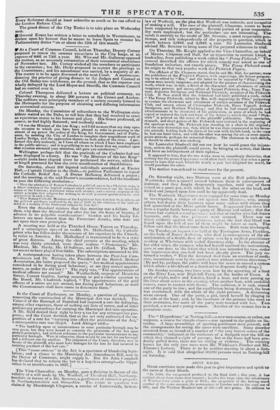..At a Court of Common Council, held on Thursday, Deputy
Corney proposed to renew the summer excursions in the City barge, at an expense of 600/. or 750/. a year. Mr. Wire and Mr. Galloway opposed the motion, as an unseemly retractation of their economical resolutions of November last. Mr. Corney wished all the members to participate in the excursion ; but Mr. Hicks proposed to restrict the privilege to ,the Committees; and his amendment was carried, by a majority of 40. The matter is to be again discussed at the next Court. A motion con- demning the practice of giving dinners to the Judges and Counsel at the Old Bailey was withdrawn, on the ground, that as the expense was wholly defrayed by the Lord Mayor and Sheriffs, the Common Council Lad no control over it.
Colonel Thompson delivered a lecture on political economy, on Thursday evening, to about 200 persons at the Crown and Anchor. The auditors were principally members of a society recently formed in the Metropolis for the purpose of obtaining and diffusing information on economical science.
On Monday, the Committee of subscribers to the Wellington civic tribute waited on the Duke, to tell him that they had resolved to erect an equestrian statue to his honour and glory. His Grace professed, of .course, to feel highly flattered; and modestly said-
" I was the Minister of the late Kiug ; and I did no more than my duty upon the occasion to which you have been pleased to refer in promoting to the utmost of my power the orders of the King, his Government, and of Parlia- ment, by assisting the City of London to complete their magnificent work of London Bridge, and the approaches thereto on both sides of the river. I per- formed this duty zealously, as I have all others on which I have been employed in the public service; and it is gratifying to me to know that my conduct upon that occasion attracted your attention, and gave you satisfaction."
Wellington perhaps felt that the gratitude of the Cocknies had not been displayed in a hurry. He was "the Minister of the late King" —eight years have elapsed since he performed the service, which has at length procured for him the civic manifestation of thankfulness.
On Saturday, about 300 bigoted individuals assembled at Exeter liall,—Captain Gordon in the chair,—to petition Parliament to repeal the Catholic Relief Act. A Doctor Holloway delivered a prayer ; and the meeting, at the said Doctor's recommendation, bad the insolence to pass the following resolution--;
" That the admission of Roman Catholics to political power in a Christian state, is a direct violation or the implied compact which exists between it and the motal Go- vernor of the Universe; a national union with idolatry, and a virtual itdoption of the infidel principle, that religion has nothing to do with personal qualification for civil government in such a State.
" That Roman Catholic Members of the Legislature hare forfeited their title to all the political privileges conferred by tint Act of 1821, by the violation of tire oath ex- acted as a security to the Protestant religion by that Act."
Even the Standard rejoices dud this meeting was a failure. But then, why does the Standard day after day fan the flame of bigotry, if adverse to its palpable manifestation ? Gordon and his booby fol- lowers are more honest than the Protestant Jesuits, who dare not act upon their own principles.
A meeting was held at the Thatched House Tavern on Thursday, and a subscription opened to enable Dr. Mulholland, the Catholic priest who has fallen under the censure of his superiors in the Church, to retire to America. Dr. Mulholland is represented to be in a state of great distress. Among the chief persons at the meeting, which was very thinly attended, were those zealous " Protestants," Mr. Maclean, Mr. Hardy, Mr. O'Sullivan, and Dr. Gifford. The Doc- tor seems to have played first fiddle. The subscriptions amounted to 101.
A correspondence having taken place between the Poor-law Com- missioners and Dr. Webster, the President of the British Medical Association,.the latter proposed the query, "Are medical appointments considered to be during good behaviour; or are they annual appoint-
ments, as under the old law?" The reply was," The appointments of medical officers are annual." Mr. Weatherfield, surgeon of Henrietta Street, Covent Garden, having occasion to put a similar question to the Board, Mr. Chadwick replied, " The appointments of the paid officers of a union are not annual, but during good behaviour, or until the Commissioners shall have cause to determine them."


























 Previous page
Previous page